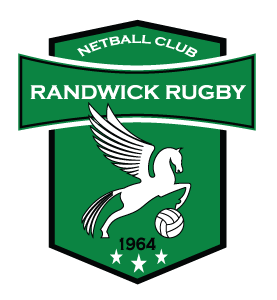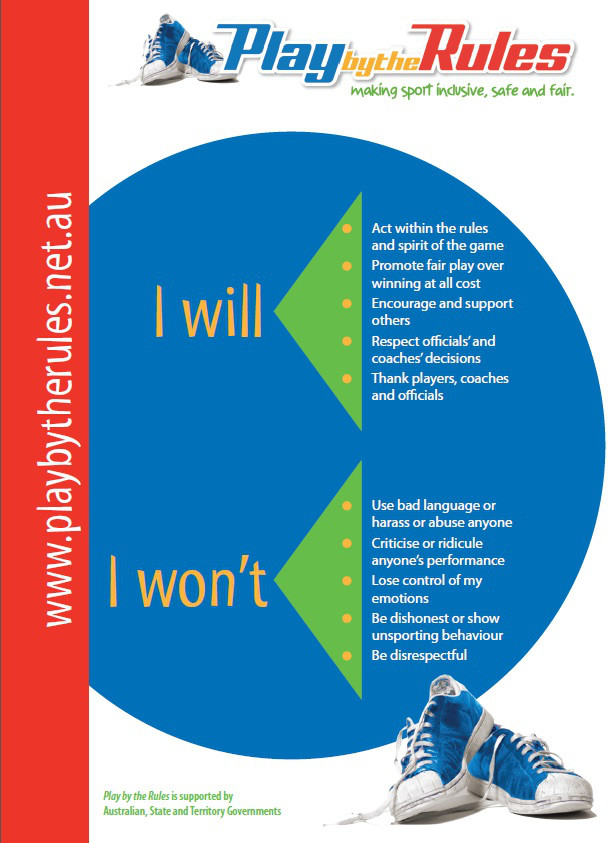
Randwick Rugby Netball Club pride ourselves in being a tolerant, good and fair sporting club and encourage all of our players, families and friends to support our policies and help us promote this culture through our sporting community.
We ask players and parents to remember that all Randwick Rugby Netball's officials and coaches are volunteers, giving up their time to allow you/your child to play netball. Netball is a team sport. It takes a whole team working together to win a game. Work with your coach and teammates to build a strong team and a fun atmosphere to play in.
Our club fully supports the SHOOSH FOR KIDS program - see below for ideas on how parents can help create a more enjoyable environment for our young players - LET KIDS BE KIDS, PROMOTE FAIR PLAY AND BE POSITIVE.
For other great resources and information please click here to go to the PLAY BY THE RULES website.
Below are details on our club's policies Zero Tolerance, Grading & Team Selection, Court Time & Position Rotations as well as the Codes of Conduct.
ZERO TOLERANCE POLICY
ZERO TOLERANCE POLICY
As a club we take the abuse of any official, player or spectator very seriously. We have a ZERO TOLERANCE POLICY to breaches of the codes of conduct. Members of our Executive Committee will review any complaint against one of our players, officials or parents. If that person was deemed to have breached the Code of Conduct, they will receive one warning only and any repeated breach will see disciplinary action such as suspension and/or exclusion from future membership with our club.
SHOOSH FOR KIDS
AN INITIATIVE FROM THE NSW DEPT OF SPORT TO PROMOTE POSITIVE BEHAVIOUR AT JUNIOR SPORT

COURT TIME/POSITIONS
COURT PLAYING TIME / POSITIONS POLICY - COMPETITIVE TEAMS 10 YEARS & OLDER
Please be aware that unlike some other clubs, Randwick Rugby Netball Club has a strong tradition of having an EQUAL COURT TIME POLICY during the normal round games. For the semi finals - grand finals court time and positional rotations are at the coach's discretion.
- This means we may manage our positional rotations different to other clubs that may play the same player in the same position all game each week or sit players off for half games most weeks. We aim to get all players on the court as much as possible.
- Coaches will average this out best they can over the season, not necessarily each game.
- Playing positions are decided by the coach based on the team’s requirement and player’s development not the player's or parent’s preferences (although this can be considered).
- At training and in matches players will be asked to experience different positions. This is beneficial to the player’s overall development and necessary for the coach to be able to rotate players fairly on court in accordance with our Equal Court Time policy.
- It is common practice for coaches of young teams and newly formed teams to try various positions for players while they assess what will work best for the team as well as for players working within our Equal Court Time Policy.
- Players and parents are expected to accept and support the coach's decisions.
- During semis finals to grand finals court time and positional rotations are solely at the coach’s discretion and coaches are encouraged to select the strongest roster. Positional rotation will then be based on a variety of factors - commitment, effort, attitude, positions able to play, opposition match up etc, injuries in team etc. Unless there are only 7 players it is impossible for all players to get exactly the same court time. The whole team has worked hard as a squad to make it to the finals and all players should support each other whoever is on court and play to the best of their ability whenever they are on court.
COURT PLAYING TIME / POSITIONS POLICY - NET SET GO TEAMS 8 AND 9 YEARS
8 and 9 years play under the modified rules of Net Set Go and we follow the Net Set Go rules and guidelines for Court Time and Positional Rotations.
- These teams can have unlimited substitution during the game and ALL players MUST experience playing ALL positions during the season.
- Coaches will draw up weekly rosters and rotate players through the positions during matches.
- Coaches will also keep a record of positions played to check that all players have played in the various positions and positions have been shared as evenly as possible.
GRADING POLICY
With so many teams in our club it is important that team selections run smoothly and that everyone understands the process. Grading is the process of establishing the number and composition of Randwick Rugby Netball Club (RRNC) teams to compete in the Randwick Netball Association (RNA) competition and which division of competition to request for each team. Grading is influenced by the number and ages of players registered with RRNC and our team selection and grading process aims to achieve teams that have a balanced group of players in playing positions and ability levels. We are fortunate to have a Selection Committee with many years of coaching and selection experience.
NET SET GO COMPETITION PROGRAM You must be turning 7, 8 or 9 in 2019 to play in the 8 and 9 years Net Set Go Competition (7 yr olds play in the 8Yrs teams). These teams are non-competitive and only play matches as an introduction to netball, so therefore are NOT graded, however playing experience/school year may be considered when grouping players into teams. Teams are formed depending on the number of players that register in each age. Requests to play with friends will be accommodated where possible, depending on overall registrations in that age group. Requests relating to team placement of players need to be made at registration stating reasons and will be considered by the committee. We are an inclusive club, so if necessary we will add players to existing "friend" groups to ensure an even, fair allocation of players. Players turning 9 who have experience playing in the Net Set Go Competition may request to play in the Junior 10 year competition with older friends or to be placed in the lowest division within that age group with other experienced 9 year olds. Requests need to be made when registering. Your request will be considered by the Grading Committee, and you will need to attend the 10 years grading session for assessment. Note that some 9 years may not be ready to play in the older competition for a variety of reasons – confidence, physical development etc - and our selectors will judge if any 9 year old is suitable for the 10 Yrs grade. Playing in a friendship group requests - requests from players wanting to play together need to be made on your registration form and will be considered by the grading committee providing players are ranked by the grading committee to be of a similar playing ability. Each player must make the request and parents cannot make requests on behalf of others. Note if stronger players are identified, to be fair to those players we will place those players in a higher ranked team and the parents/players allowed to accept or decline. All 10s,11s and juniors wishing to trial for the top competitive teams or are looking to move teams must attend the practical grading day. 12s and older in lower division teams happy to stay together will be advised if required at grading. Failure to attend may result in disappointment, as positions in teams will not be held for absent players without prior warning. If a player is unable to attend the scheduled grading day, the player’s parent/guardian must advise the RRNC Secretary by email with the explanation, or if a player is injured or sick on the day please contact the Secretary on 0438 774 654. Please ensure you attend the date for the age the player is turning in the playing year. If requesting to play a higher age group, the selectors will first consider this at your own age grading and you may be asked to attend the higher grading day. The exception to this policy is any junior player that already played up in Intermediates or Seniors can attend Intermediates or Senior grading. The decision to grade a player who is unable to attend practical grading day will be based on the RRNC grading policy and process, feedback from previous coach/manager, historical performance, player numbers and positions. The RRNC committee decision will be final. Full teams and individuals may be registered within these groups. Practical Grading is held for new Intermediates and Senior players to the club so you can be placed in an appropriate team. If grading is required for any other players or grades, notification will be sent to the relevant players. Intermediate and Senior players are encouraged to get involved at the club with coaching, umpiring etc so please consider volunteering for a role with the club when registering. **This year players wishing to be considered for A1 and A2 need to attend grading as we have a number of young players moving up and new players to consider. Players that requested to stay in friendship groups may be “paper graded” or we may ask the team to attend practical grading to assess which grade within the competition to request for the team. In forming teams, the selectors take into consideration the Coaches' reports, independent assessment reports, paper grading and play observed at practical grading, while keeping in mind that a netball team requires a balance of height, agility and ball skills, as well as defences, centre court and shooters. On completion of the RRNC grading process, teams and our requested divisions are submitted to the RNA. RNA then has a Competition Grading Committee who finalise age groups and divisions for the whole competition. Note: that as a club we request certain divisions for teams however the final decision of team placement within divisions is made by the RNA. Our 2019 team selections will commence after the registration closing date. All teams will be finalised after the completion of all grading days when the grading committee will meet and sort teams. Team lists will then be collated and summaries published on the website by TBA. We then submit the team lists to RNA on TBA and RNA grades all teams into the competition divisions and time slots. Coaches are appointed while teams are being finalised and then sent team contacts. Coaches will contact team members to arrange training.7,8 & 9 YEAR OLD PLAYERS
JUNIOR PLAYERS AGED 10 YEARS - 15 YEARS
INTERMEDIATE & SENIOR PLAYERS
GRADING PROCESS
CODES OF CONDUCT
All members must abide by the Codes of Conduct and agree to support our efforts to promote good sportsmanship and abolish inappropriate behaviour. The codes of conduct apply to social media postings, emails, phone calls as well as behaviour at the courts. The codes of conduct also apply to all officials, spectators and players, whether representing RRNC, Randwick Netball Association or another club.
Players' Code of Behaviour Parents' and Spectators' Code of Behaviour Coaches' Code of Behaviour Officials' Code of BehaviourPLAYER'S
PARENTS/SPECTATORS
COACHES'
OFFICIAL'S



